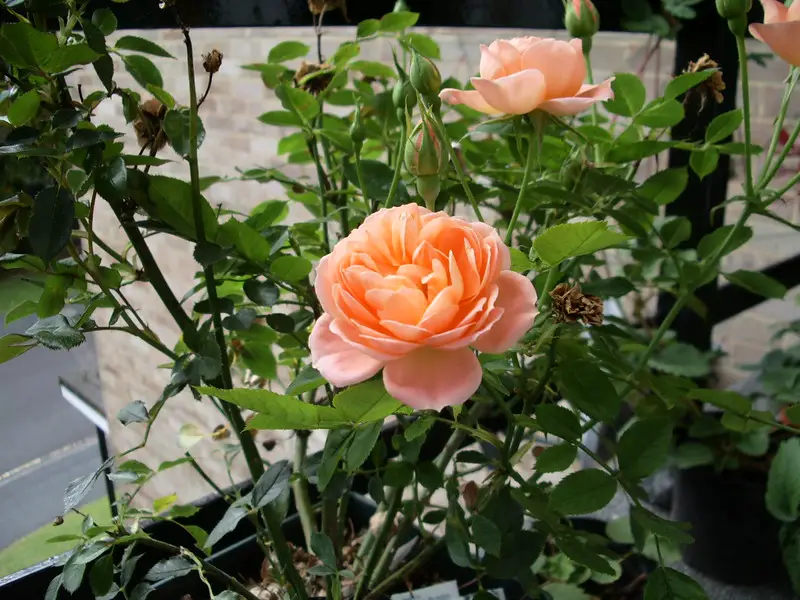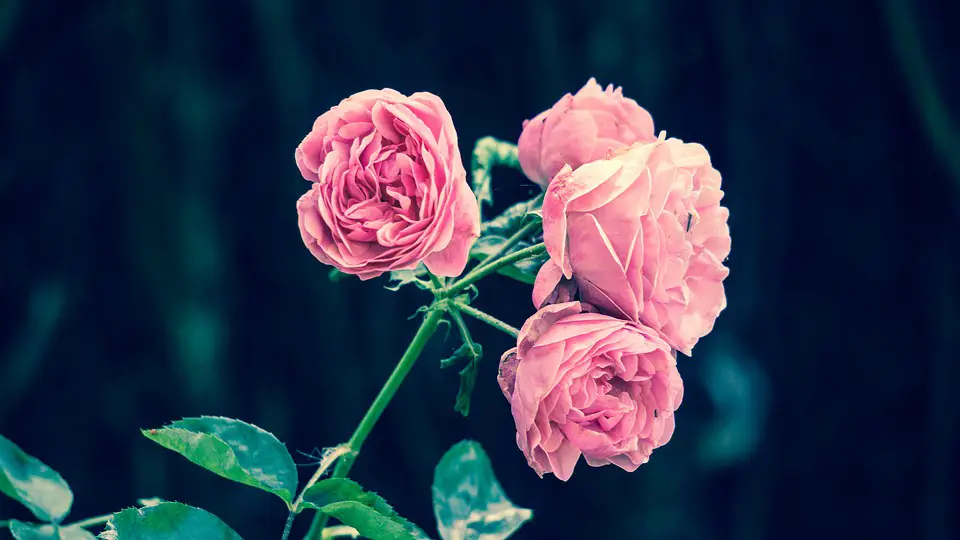We use affiliate links to run our site. When you buy through links on our site, we may earn an affiliate commission, without any added cost to you. Learn more
Fertilizing a rose plant can be a major concern for many gardeners. Without proper fertilization, your rose might never bloom as per your expectation.
Fertilization is an integral part of rose gardening. In our earlier post, we discussed rose fertilization in brief, here in this post we will give you a detailed view of how you can fertilize your rose bushes organically, without using any chemicals.
How Do You Fertilize Roses Naturally?
Organic or natural fertilizers by definition are derived from natural sources like plants and animals. The best part of using organic fertilizers to fertilize rose plants is that they are friendly to the environment and have multiple nutrients in them so you can use them alone or put them in combinations.
When you fertilize your rose plant with organic fertilizers you also improve the soil quality overall.
What Are The Nutrients A Rose Plant Needs:
The followings are the main plant nutrients that a rose plant needs to thrive.
Nitrogen (N):
Nitrogen is an essential part of any plant’s growth. In a rose plant nitrogen is needed for leaf formation, healthy foliage development, and overall growth.
Phosphorous (P):
Phosphorous is a critical element for flower formation. So for a bountiful bloom make sure you keep fertilizing your rose plant with enough amount of phosphorous. phosphorous also encourages root development in your rose plant.
Potassium (K):
Potassium is also an essential element for flower formation in rose plants. Lack of potassium can result in poorly developed buds and weak flower stems.
Calcium (Ca):
Calcium helps to strengthen the walls of the plant’s cell tissue. It also promotes healthy green foliage on rose bushes and develops strong root systems.
Magnesium (Mg):
Magnesium helps your rose plants grow bushier and intensify the colors of leaves and flowers. It also boosts chlorophyll production on the leaves and boosts flowering. Lack of magnesium can also hamper nitrogen intake in roses. Magnesium also aids in the seed germination process in roses.
Other than these above-mentioned elements arose plant also needs trace elements like Boron (B), copper (Cu), Sulfur (S) iron (Fe), manganese (Mn), and zinc (Zn) for thriving.

What is The Best Fertilizer For Roses?
Following are some of the best organic fertilizers for your rose plants. Some of these are capable of solely providing nutrition to your rose plant, whereas for some other you need to combine them with other organic fertilizers.
How to grow rose plants from bare root roses
1. Compost:
A good quality compost boost any plant’s health and rose is not an exception. Compost, alfalfa meal, and composted manures are slow-release fertilizers that nourish rose bushes and improve soil quality. Preparing compost is also a pretty easy job. We discussed the ideal compost recipe in this post you can read it for more information.
During the springs a 1-2 inch layer of compost around the base of your rose plant will do a lot of good to the plant.
2. Manure:
Manure works pretty well to fertilize your rose plants, but make sure it is well rotted. The more aged the manure the better it is for your roses. Among all the manures cow, horse, and chicken manures work best for roses.
We have a detailed post dedicated to manure, where you can learn more about different types of manures and their pros and cons, go check that out.
3. Bone Meal:
Bone meal supplies phosphorous and calcium to your rose plants. The best time to add bone means to the soil is in the springs. As they release the nutrient slowly it will be beneficial for next year’s growth. Applying bone meals to the rose generally results in bigger and more plentiful flowers.
4. Cottonseed Meal:
Blood meal, cottonseed meal, and fish meal or emulsion are all quick sources of nitrogen. Cottonseed meal also reduces the pH of the soil. So keep a soil testing kit near you. Although roses prefer slightly acidic soil, too much acid can harm your plant.
5. Kelp:
Kelp along with other seaweed extracts promotes root development in roses. They are first dried and made into a granular form. This way it will be easy to add to the soil. You can apply kelp solely or in combination with other organic fertilizers.
Other than fertilizing the soil they also boost plant immunity to fight against pests and diseases. The best practice is to add kelp from time to time regardless of other fertilizers.
6. Epsom Salt:
Epsom salts provide magnesium to your rose plant. Apply Epsom salt in the spring, just as the buds are beginning to open. Add 1/2 a cup salt in water, once it dissolves totally, apply the solution around the rose bush.
7. Egg Shells:
Eggshells are an excellent source of calcium and are very good for your rose plants. It strengthens the cell walls of the plant. Crush eggshells and apply them around the base of your rose plant. It is one of the cheapest ways to increase calcium in the soil.
8. Used Tea Leaves and Tea Bags:
Tea leaves have tannic acid in them. When you add used tea leaves and bags the soil gets enriched with tannic acid. This component is very nutritious for roses. They also have caffeine, among other nutrients. The caffeine stimulates the soil, which helps roses. Tea leaves add valuable nitrogen, and potassium to your rose plant.
9. Banana Peel:
Banana peels are enriched with potassium. They also degenerate pretty quickly. Other than potassium banana peels are also full of nutrients like sulfur, calcium, and magnesium.
Put banana peels in a jar and then fill the jar with water. Cover the jar with a cloth or some breathable lid. Within a couple of weeks, the peels will rot and release nutrients into the water. Now apply this water around the roots of your rose plant.
We have a detailed article on banana peel fertilizer see it for more information on this wonderful organic fertilizer.
10. Cooking Water:
Don’t through away your boiled vegetable water into the drain, use it to fertilize the roses. When you boil your vegetables many of the micronutrients such as phosphorus, nitrogen, and calcium are boiled off into the water. Once the water cools off use the water to fertilize your rose bushes.
Not only this is a cost-effective way to fertilize rose plants but it also helps your soil retain more moisture, so your watering frequency will be reduced.
What Is The Best Time To Fertilize Roses?
Generally, you need to fertilize a rose plant twice a year. The first time, when the plants start to leaf out. Generally, it is in the month of March or April. And the second time when the rose plants start to flower. Generally in the month of May or June.
For some varieties like Hybrid tea roses or Grandiflora roses, you may have to fertilize for the third time, generally in the month of August.
How Do You Fertilize A Potted Rose?
When you grow roses in a container, you need to fertilize your rose more frequently than when you grow them directly on the ground. For container roses, add 2/3rd potting mix and 1/3 compost at the time of planting. Use a good quality organic fertilizer like this one to fertilize the roses especially when the buds start forming.
How to Apply Fertilizer to Rose Bushes:
The application of fertilizer is not uniform for all types of roses and bushes. It depends on different factors like rose variety, present soil condition, etc. As a general rule apply one cup of balanced fertilizer once the new growth starts to appear.
You can either mix it with water to make it easy to absorb or you can directly add the granules to the soil where they will release the nutrients slowly over time.
Learn more about growing roses in your garden in this post.
Amazon and the Amazon logo are trademarks of Amazon.com, Inc, or its affiliates.

Hi there! My name is Prasenjit and I’m an avid gardener and someone who has grown a passion for growing plants. From my hands-on experience, I have learned what works and what doesn’t. Here I share everything I have learned.
